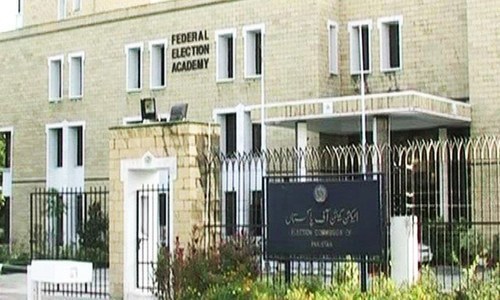ISLAMABAD: Three out of the four members of the Election Commission had been appointed in contravention of a constitutional provision that bars re-employment of judges of the superior judiciary within two years of their retirement, it has emerged.
Article 207 (2) of the Constitution reads: “A person who has held office as judge of the Supreme Court or of a high court shall not hold any office of profit in the service of Pakistan, not being a judicial or quasi judicial office or the office of Chief Election Commissioner or of Chairman or member of a law commission or of Chairman or member of the Council of Islamic Ideology, before the expiration of two years after he has ceased to hold that office”.
None of the three retired judges who had been appointed as ECP members had completed two years after their retirement.
ECP secretary says members’ appointment a past and closed transaction
The most glaring case was that of retired justice Shakeel Ahmad Baloch, who took oath as member of ECP from Balochistan five days after resigning as judge of the Balochistan High Court on July 21, 2016 - some ten days before his retirement date. Likewise, retired Justice Irshad Qaiser became the first-ever woman member of the ECP within 45 days of her retirement as judge of the Peshawar High Court on June 14, 2016.
The member from Punjab, retired Justice Altaf Ibrahim Qureshi, had retired as judge of the Lahore High Court on March 5, 2015, and thus had more than seven months to go before the completion of the two-year post-retirement period when he was appointed to the Election Commission in July 2016.
Analysts believe that Abdul Ghaffar, the first-ever retired bureaucrat to have been picked as member of the ECP, was also not a good choice as his name was on the exit control list (ECL) over a Rs 2 billion corruption scam.
Months after his appointment as ECP member he got a one-time permission to travel abroad with a delegation headed by the Chief Election Commissioner.
The commission’s secretary, Babar Yaqub Fateh Muhammad, refused to comment on the dictate and spirit of Article 207 of the Constitution, saying the appointment of ECP members was a past and closed transaction.
“Let bygones be bygones,” he remarked and pointed out that half the term of the members would be complete next month while two of them would be retiring on Jan 26.
Asked as to who was responsible for violation of the Constitution, he initially said the question should be put to senior members of the previous government, but then suggested that there was room in the Constitution for judicial and quasi-judicial employment of retired judges.
Some judgements of the Supreme Court have, however, made it clear that the Election Commission was not a judicial forum. An 11-member bench held in the Benazir Bhutto versus federation of Pakistan case that the Election Commission was not a judicial body.
In its judgement in a recent case, a three-member bench of the apex court, headed by Chief Justice Mian Saqib Nisar, said: “The ECP is an independent and autonomous body which exercises executive and regulatory powers derived from the Constitution.
“Although it has the power to appoint election tribunals [Article 219(c) of the Constitution] which exercise judicial powers under Article 225 of the Constitution, the ECP itself is a supervisory body which exercises regulatory and administrative powers under the Constitution and the law. Undoubtedly, the ECP is not a court or a tribunal, as argued by the learned counsel for PTI.”
The ECP members who are otherwise ineligible for appointment had been brought in under a covert understanding between the PML-N and the PPP. Although under the procedure, the prime minister, in consultation with the opposition leader, sends three names each for a position of ECP member for confirmation to a parliamentary panel, separate lists are sent in case they fail to reach a consensus.
While an impression had been created as if a consensus could not be reached, in both 12-name lists, all four successful nominees were mentioned by the PML-N as its second-choice candidates while two of the confirmed members were the PPP’s first-choice and two were its second-choice. So the panel picked all the four names that were common in the lists in an exercise that took less than two hours. This had only been done to defeat the spirit of the law, which otherwise required hearing by the parliamentary panel.
Published in Dawn, December 17th, 2018














































